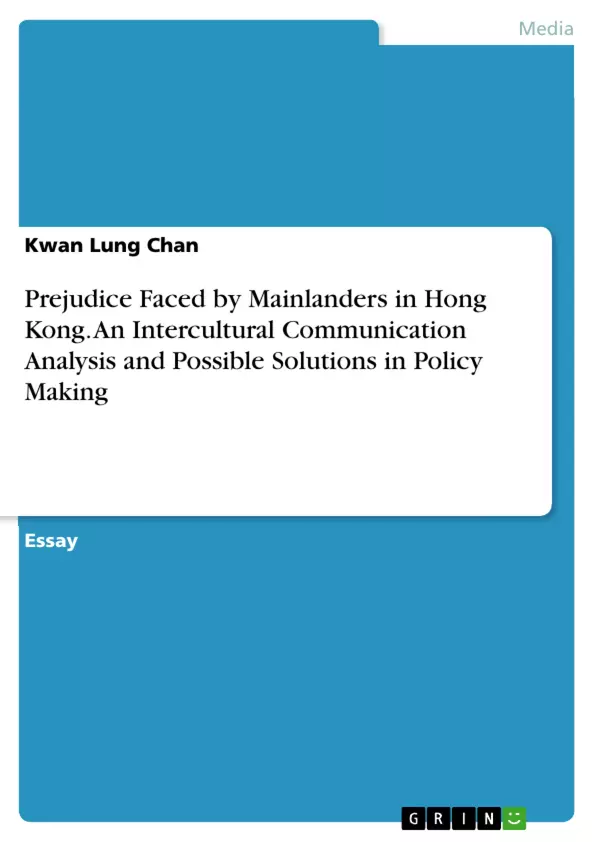Since the implementation of Individual Visit Scheme, the number of mainland visitors visiting Hong Kong has increased at a tremendous speed. Although it stimulated Hong Kong's economy and increased capital inflow, it has also brought about culture shock to Hong Kong people. The ‘uncivilized’ behaviors of mainlanders have been reported by various media and includes pooing and peeing in the public, littering and spitting, damaging public facilities, putting one’s foot on the opposite seat in public transportation, sitting on tables in public areas, washing feet using the drinking fountain, intercepting queues and speaking extremely loud etc.
Although these behaviors are tolerable in mainland China, in Hong Kong it is not due to cultural differences, and as a result these behaviors have become a prominent label for mainlanders. By assuming all people in mainland China have the tendency to perform in improper ways, mainlanders in Hong Kong face prejudice in nearly every context one can think of. This essay will first define what is prejudice, and then describe how worse is the situation that mainlanders are facing in Hong Kong in terms of prejudice, and afterwards analyze in what ways have cultural differences contributed to the distinction on level of acceptance to the above-mentioned improper behaviors, and finally give suggestions on how to eliminate this prejudice in terms of policy making.
Inhaltsverzeichnis (Table of Contents)
- Introduction
- What is Prejudice?
- Situation: How serious is prejudice faced by mainlanders in Hong Kong?
- Analysis and Meta-analysis: Dimensions of Interpersonal Relationships
- Solutions
Zielsetzung und Themenschwerpunkte (Objectives and Key Themes)
This essay aims to analyze the prejudice faced by mainlanders in Hong Kong, focusing on how cultural differences contribute to this issue and exploring potential solutions through policy making. The text argues that mainlanders face prejudice in Hong Kong due to their perceived "uncivilized" behaviors, which stem from cultural differences in control, affiliation, and activation.
- Prejudice against mainlanders in Hong Kong
- Cultural differences in control, affiliation, and activation
- The role of policy in mitigating prejudice
- Intercultural communication and understanding
- The impact of globalization on cultural perceptions
Zusammenfassung der Kapitel (Chapter Summaries)
- Introduction: This section introduces the issue of prejudice faced by mainlanders in Hong Kong, highlighting the increase in mainland visitor numbers and the perceived "uncivilized" behaviors that contribute to negative attitudes towards mainlanders. It also outlines the essay's structure, focusing on defining prejudice, analyzing the severity of the situation, exploring cultural differences, and suggesting policy solutions.
- What is Prejudice?: This chapter provides a definition of prejudice, emphasizing its negative nature and its foundation in inflexible stereotypes. It explores the human tendency to favor those similar to themselves, using research on the medial prefrontal cortex (MPFC) to illustrate this point. It concludes that prejudice is an inevitable aspect of diverse societies.
- Situation: How serious is prejudice faced by mainlanders in Hong Kong?: This section examines the impact of prejudice on mainlanders in Hong Kong, both on a macro level (policy) and a micro level (individual interactions). It highlights examples of discrimination and exclusion faced by mainlanders in Hong Kong, emphasizing the need for remedy.
- Analysis and Meta-analysis: Dimensions of Interpersonal Relationships: This chapter analyzes the three dimensions of interpersonal relationships (control, affiliation, and activation) to explain the differences in behavior between mainlanders and Hong Kong people. It explores how mainlanders' perceived high control, low affiliation, and high activation contribute to the negative perception and prejudice they face in Hong Kong. It also examines the impact of cultural differences on these dimensions.
Schlüsselwörter (Keywords)
This essay focuses on the keywords: prejudice, intercultural communication, cultural differences, control, affiliation, activation, policy making, mainland China, Hong Kong, tourism, education, Putonghua, and intergroup boundaries.
Frequently Asked Questions
Why do mainlanders face prejudice in Hong Kong?
Prejudice often stems from perceived "uncivilized" behaviors reported in the media, which create negative stereotypes affecting all mainlanders regardless of individual conduct.
How do cultural differences contribute to this conflict?
Differences in social dimensions like control, affiliation, and activation lead to different standards of behavior in public spaces, causing friction between the two groups.
What is the impact of the Individual Visit Scheme?
While it boosted Hong Kong's economy, the rapid increase in visitors also led to significant culture shock and a decrease in the level of acceptance for different social norms.
What are the psychological foundations of prejudice?
Prejudice is based on inflexible stereotypes and a human tendency to favor similar people, often linked to brain functions like the medial prefrontal cortex (MPFC).
How can policy making help reduce prejudice?
The essay suggests that government policies in education and tourism management can promote intercultural understanding and mitigate discrimination.
- Quote paper
- Bachelor of Education (Music) Kwan Lung Chan (Author), 2017, Prejudice Faced by Mainlanders in Hong Kong. An Intercultural Communication Analysis and Possible Solutions in Policy Making, Munich, GRIN Verlag, https://www.grin.com/document/448229



